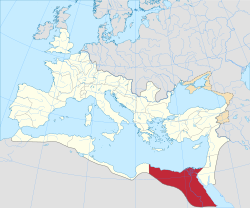Ægyptus
| Province of Aegyptus Provincia Aegypti ἐπαρχία Αἰγύπτου |
|||||
| Province of the Roman Empire | |||||
|
|||||
| Province of Aegyptus in 125 AD. | |||||
| Capital | Alexandria | ||||
| Historical era | Antiquity | ||||
| • | Conquest of Ptolemaic Egypt | 30 BC | |||
| • | Formation of the Diocese | 390 | |||
| • | Muslim conquest | 641 | |||
| Today part of |
|
||||
The Roman province of Egypt (Latin: Aegyptus, pronounced [ajˈɡʏptʊs]; Greek: Αἴγυπτος Aigyptos [ɛ́ːɡyptos]) was established in 30 BC after Octavian (the future emperor Augustus) defeated his rival Mark Antony, deposed his lover Queen Cleopatra VII and annexed the Ptolemaic Kingdom of Egypt to the Roman Empire. The province encompassed most of modern-day Egypt except for the Sinai Peninsula (which would later be conquered by Trajan). Aegyptus was bordered by the provinces of Creta et Cyrenaica to the West and Iudaea (later Arabia Petraea) to the East.
The province came to serve as a major producer of grain for the empire and had a highly developed urban economy. Aegyptus was by far the wealthiest Eastern Roman province. In Alexandria, its capital, it possessed the largest port, and the second largest city, of the Roman Empire.
As a province, Egypt was ruled by a uniquely styled Augustal prefect, instead of the traditional senatorial governor of other Roman provinces. The prefect was a man of equestrian rank and was appointed by the Emperor. The first prefect of Aegyptus, Gaius Cornelius Gallus, brought Upper Egypt under Roman control by force of arms, and established a protectorate over the southern frontier district, which had been abandoned by the later Ptolemies.
...
Wikipedia

